Church Fathers 2
Chris Knepp
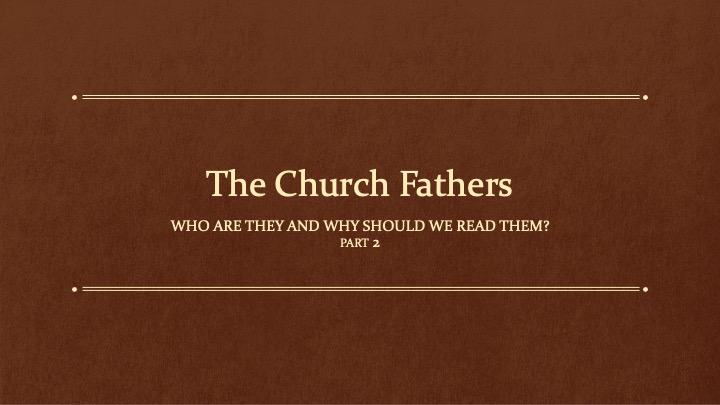
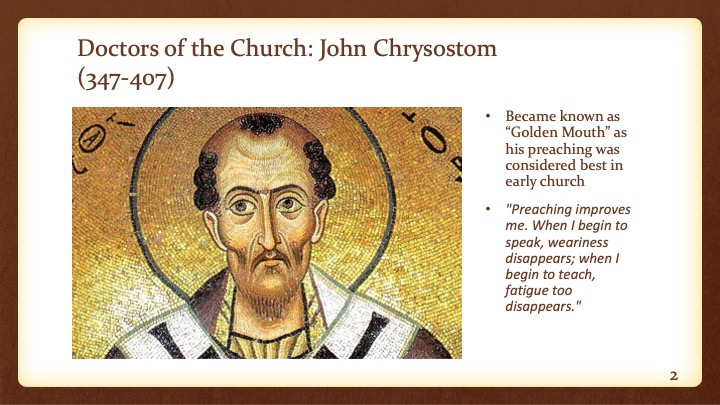
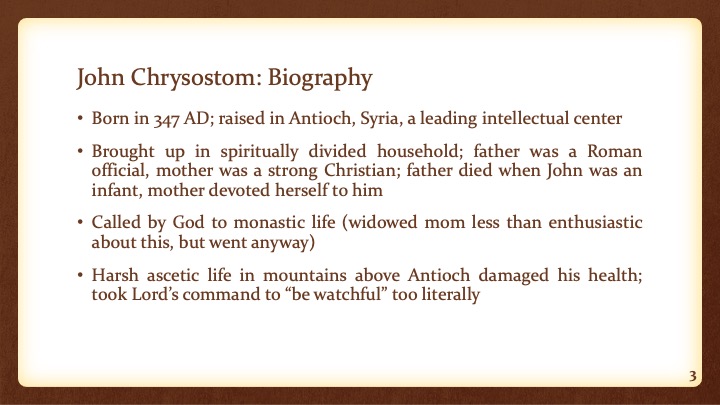
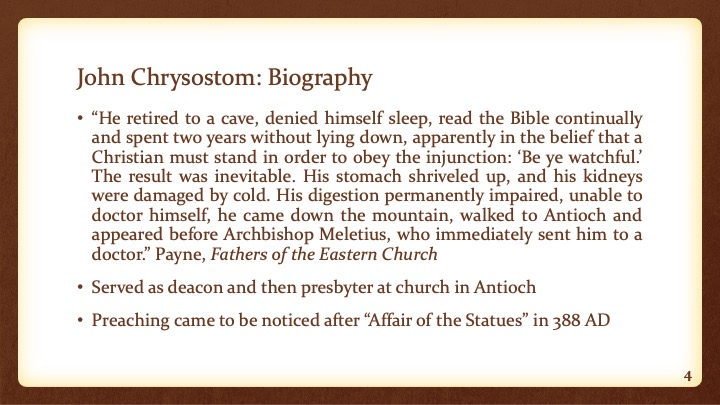
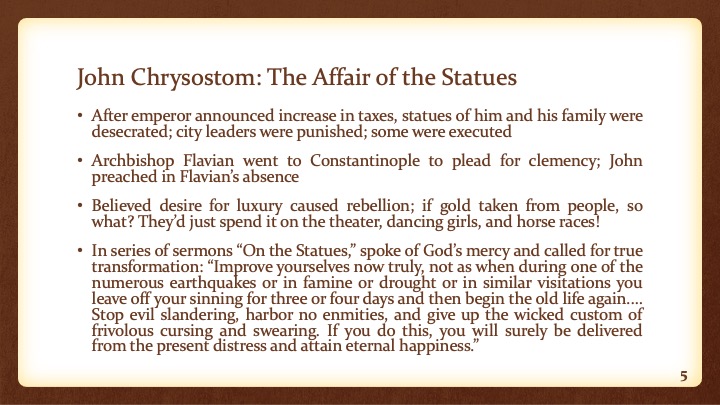
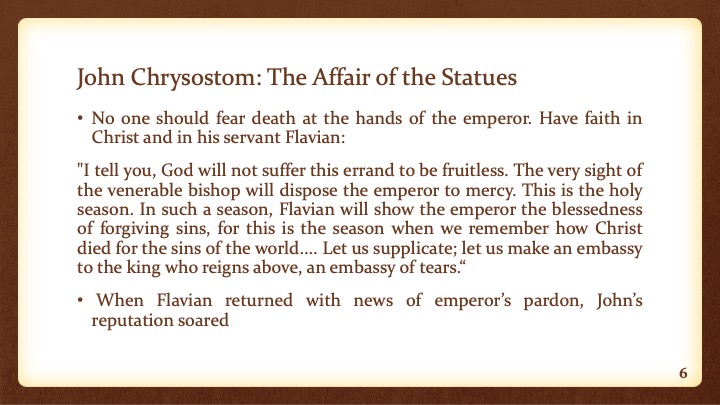
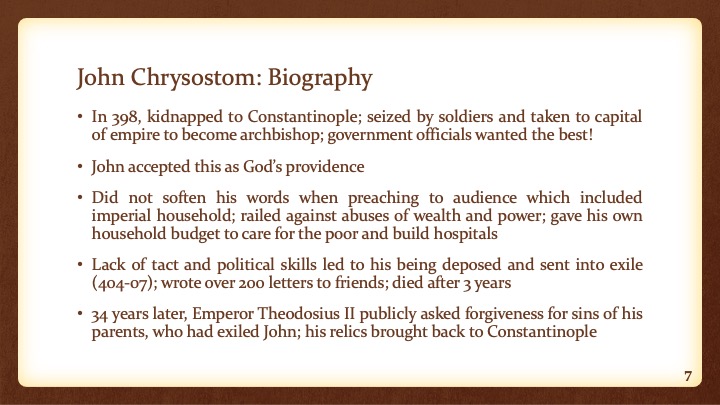
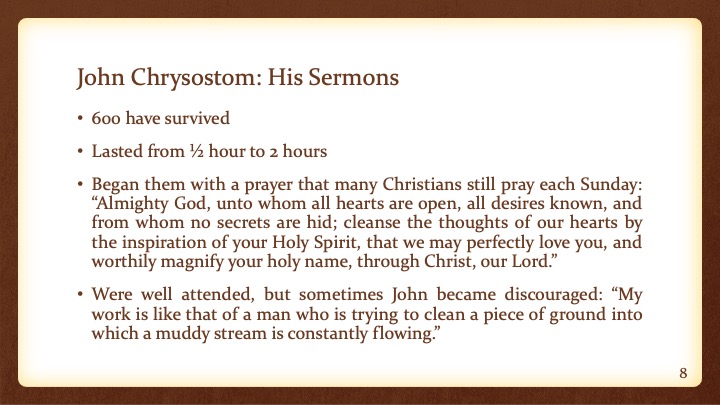
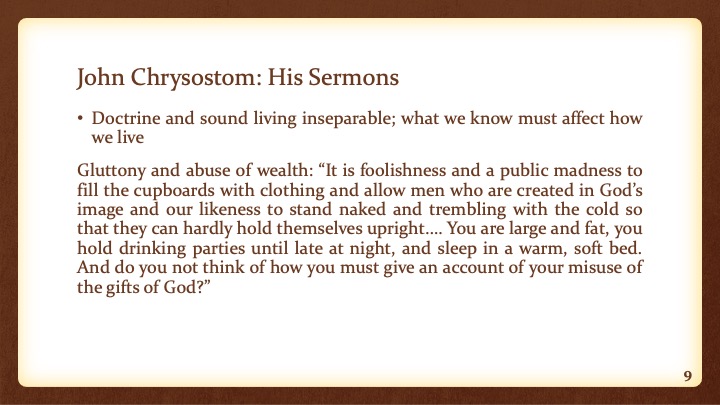
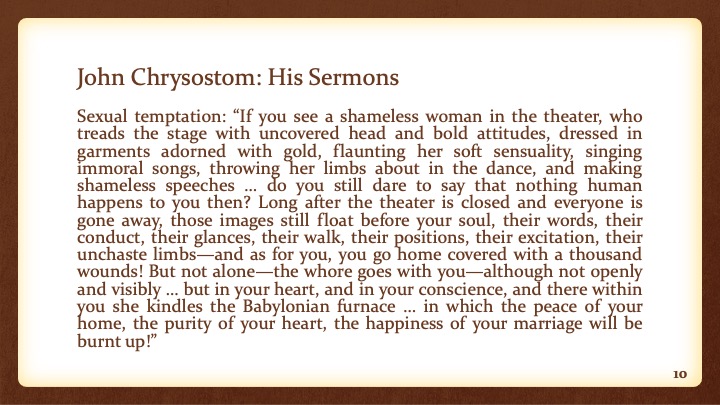
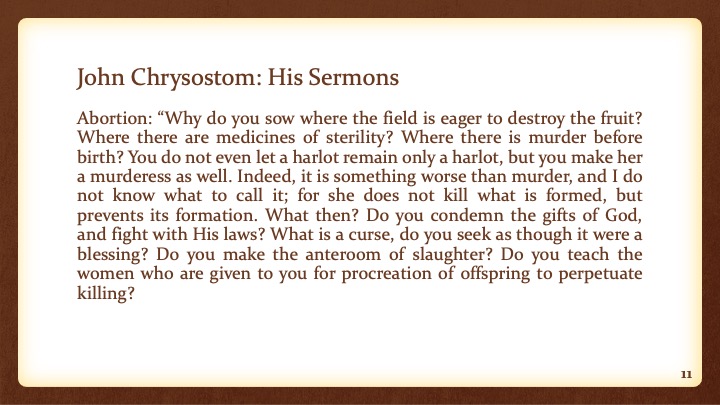
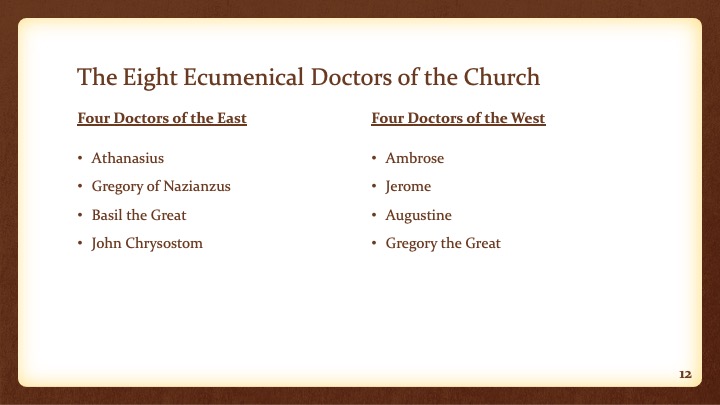
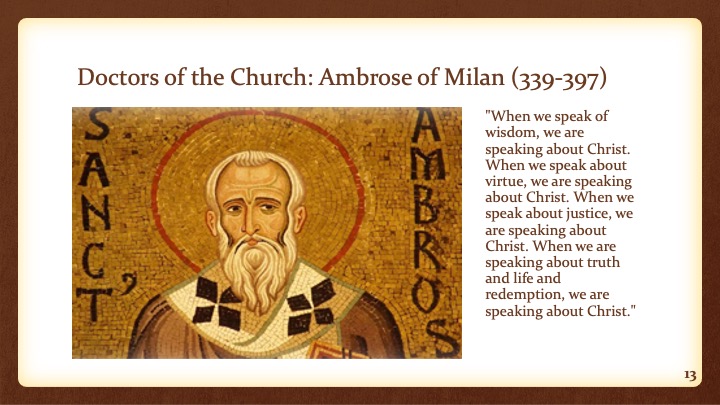
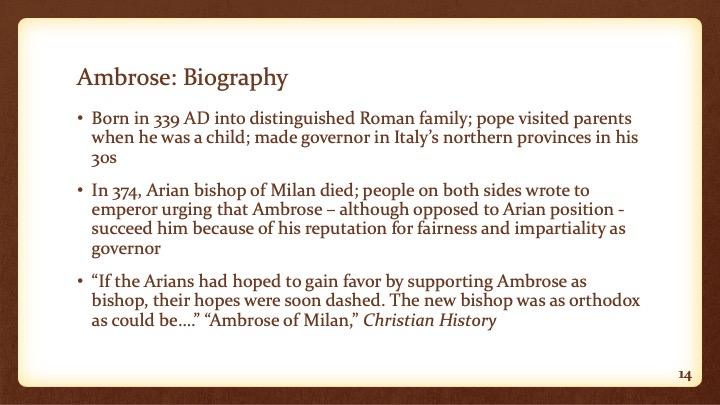
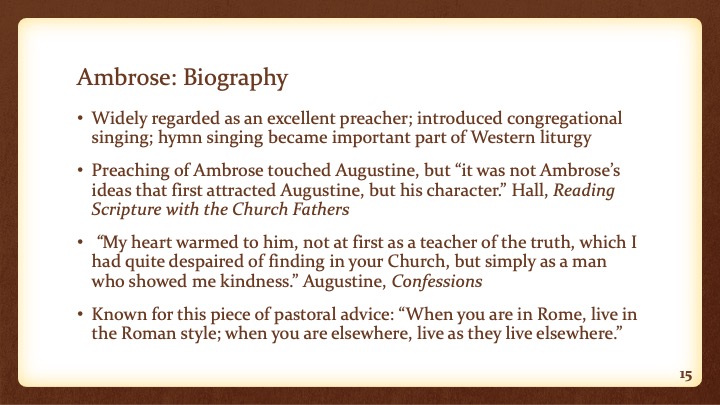
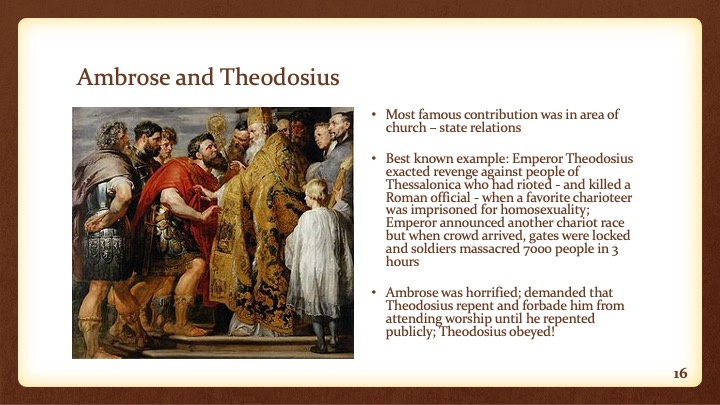
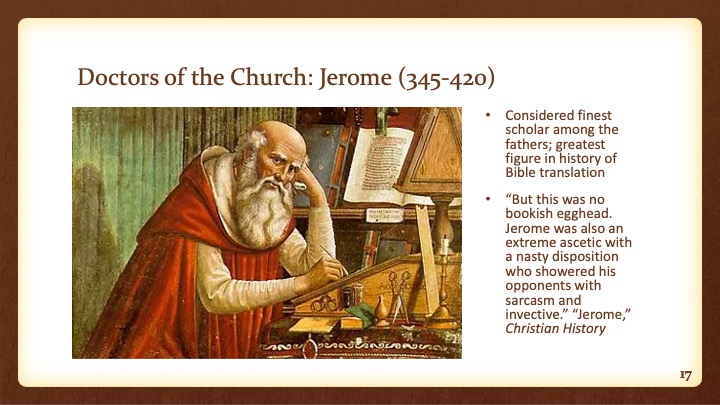
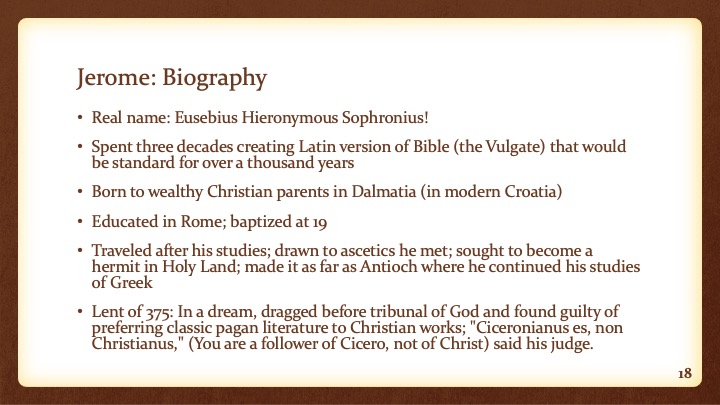
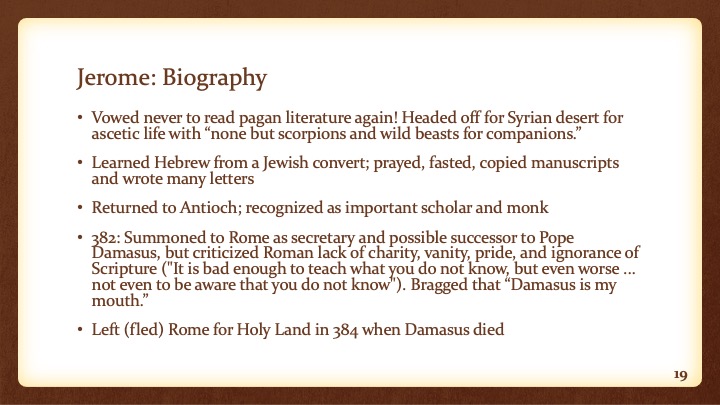
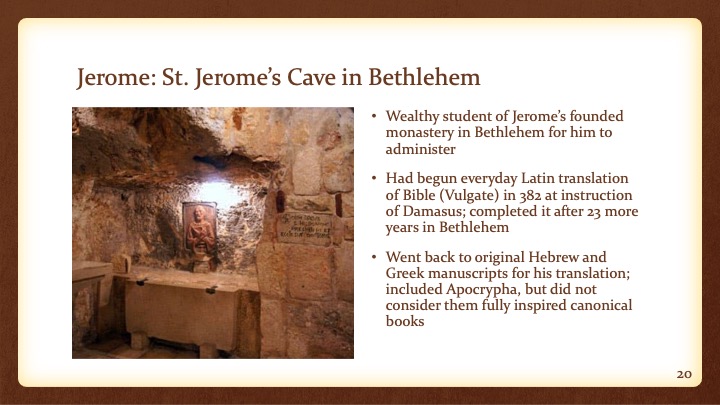
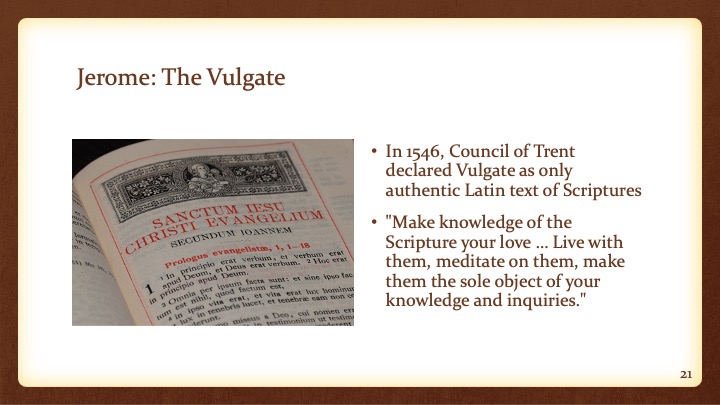
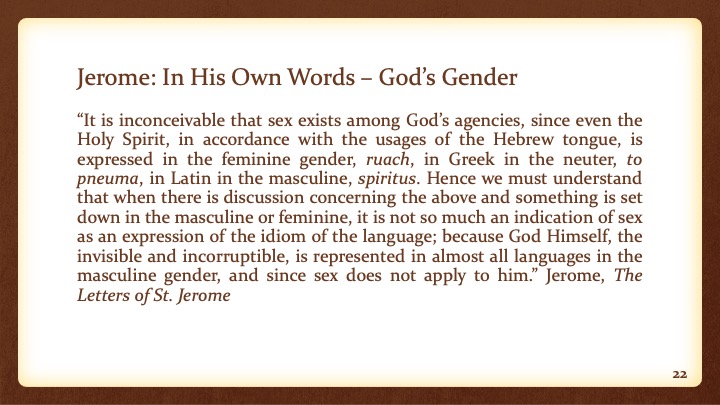
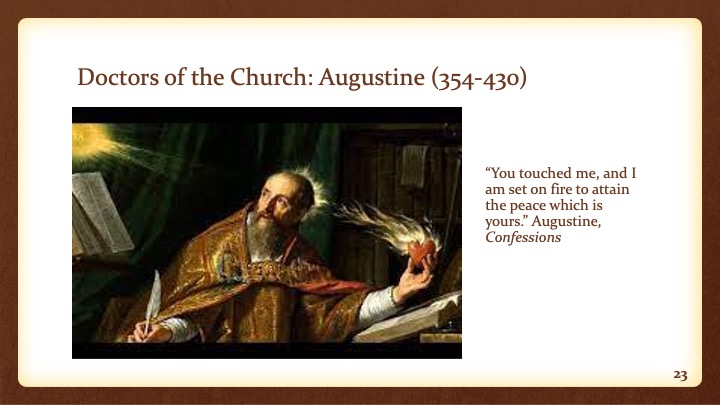
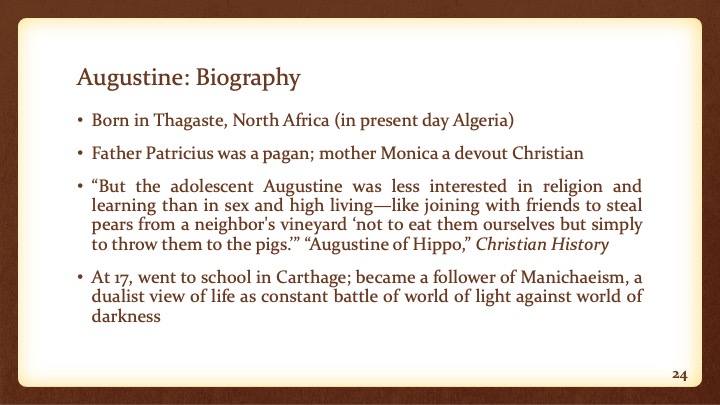
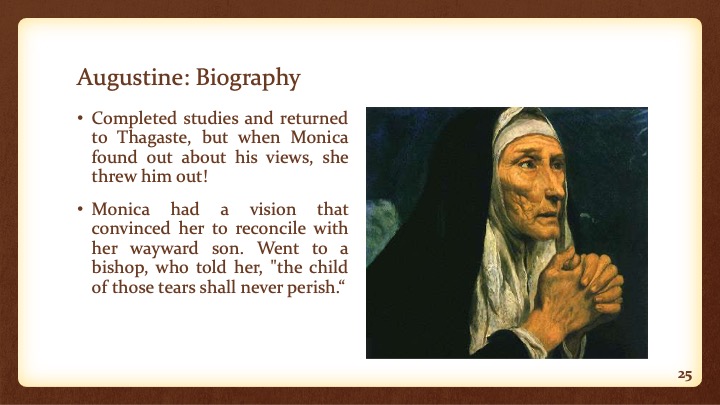
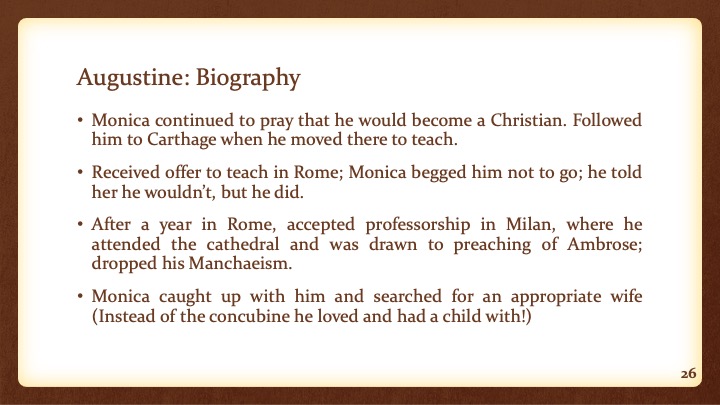
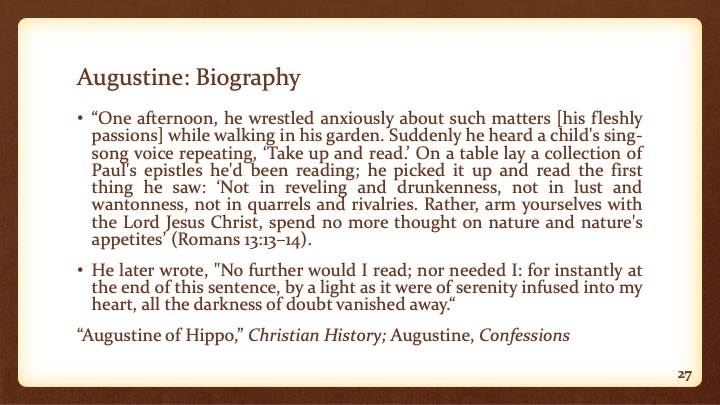
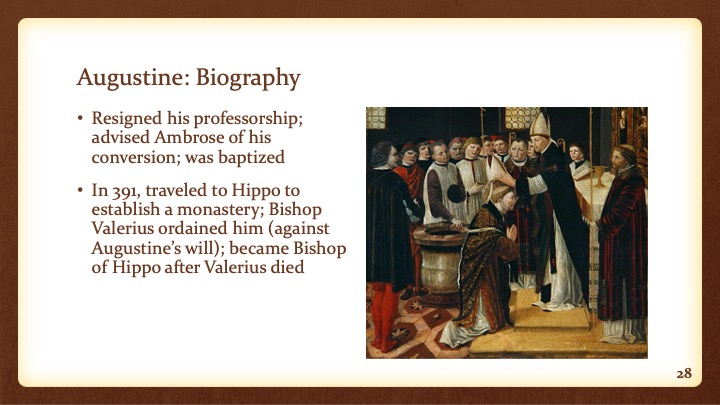
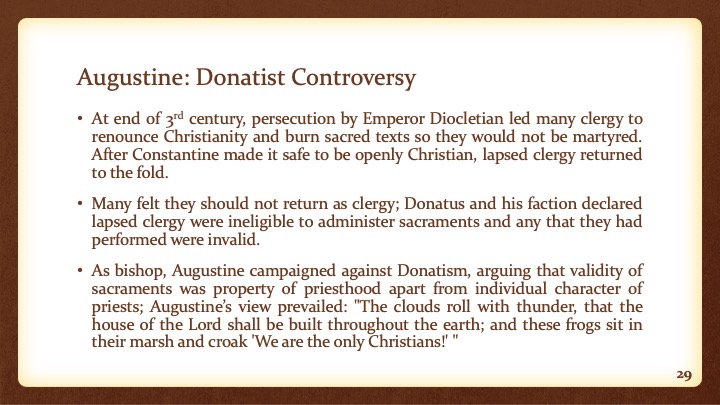
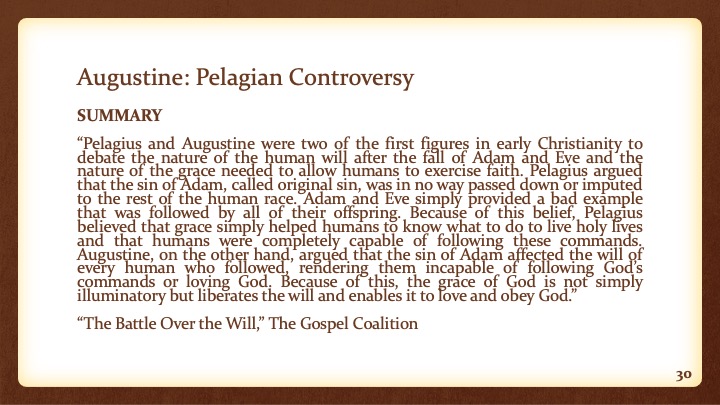
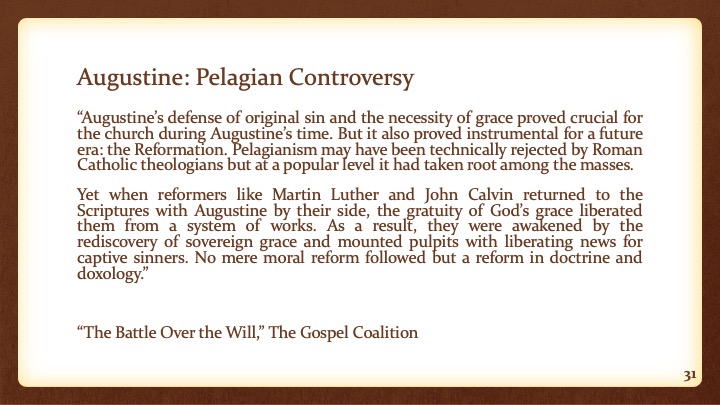
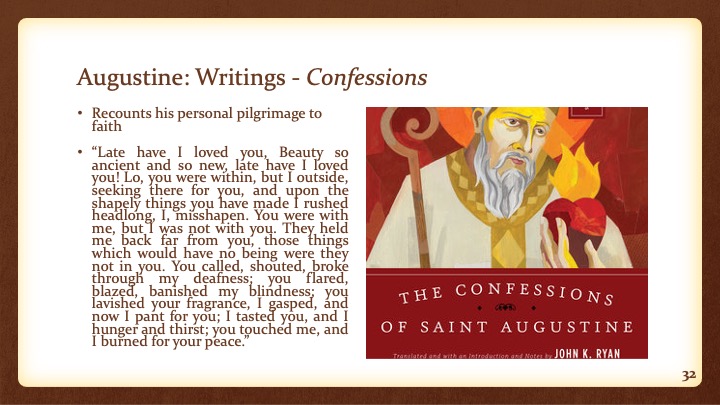
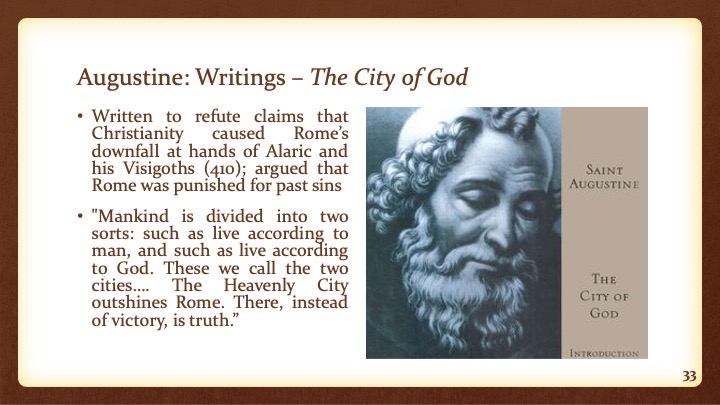
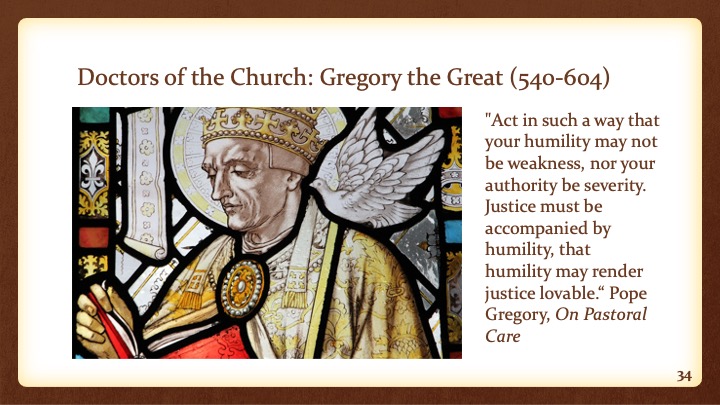
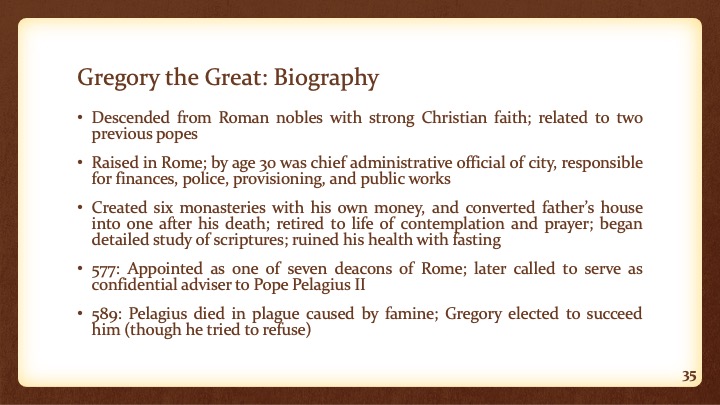
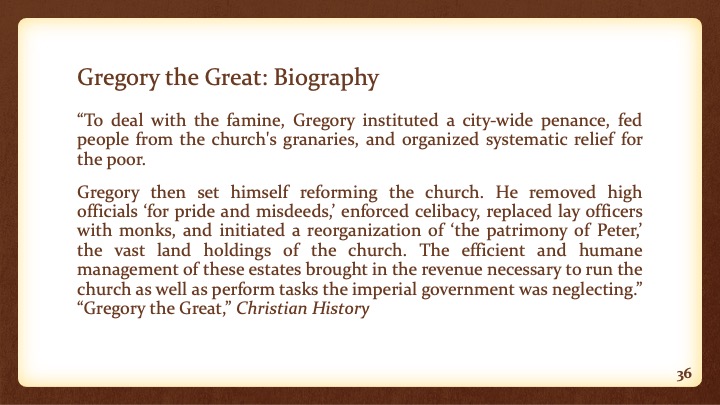
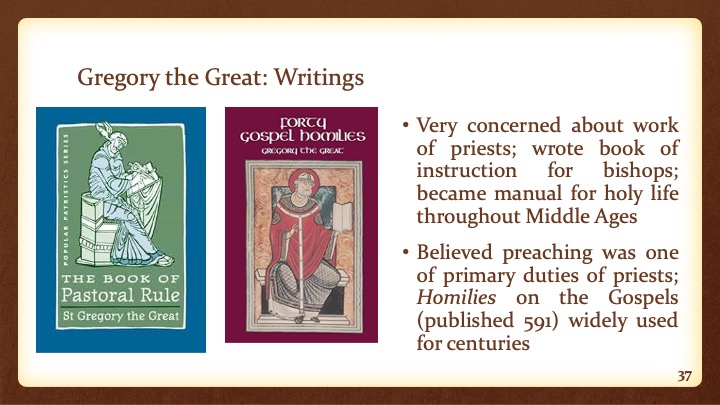
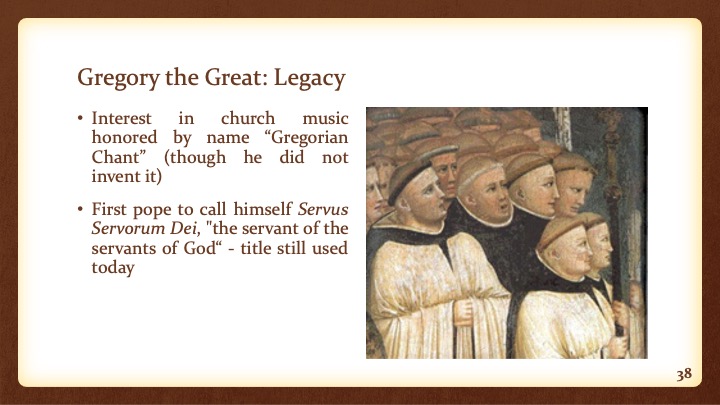
Church Fathers 2 Text
The Church Fathers (Continued)
Doctors of the Church: John Chrysostom (347-407)
• Became known as “Golden Mouth” as his preaching was considered best in early church
• "Preaching improves me. When I begin to speak, weariness disappears; when I begin to teach, fatigue too disappears."
John Chrysostom: Biography
• Born in 347 AD; raised in Antioch, Syria, a leading intellectual center
• Brought up in spiritually divided household; father was a Roman official, mother was a strong Christian; father died when John was an infant, mother devoted herself to him
• Called by God to monastic life (widowed mom less than enthusiastic about this, but went anyway)
• Harsh ascetic life in mountains above Antioch damaged his health; took Lord’s command to “be watchful” too literally
• “He retired to a cave, denied himself sleep, read the Bible continually and spent two years without lying down, apparently in the belief that a Christian must stand in order to obey the injunction: ‘Be ye watchful.’ The result was inevitable. His stomach shriveled up, and his kidneys were damaged by cold. His digestion permanently impaired, unable to doctor himself, he came down the mountain, walked to Antioch and appeared before Archbishop Meletius, who immediately sent him to a doctor.” Payne, Fathers of the Eastern Church
• Served as deacon and then presbyter at church in Antioch
• Preaching came to be noticed after “Affair of the Statues” in 388 AD
John Chrysostom: The Affair of the Statues
• After emperor announced increase in taxes, statues of him and his family were desecrated; city leaders were punished; some were executed
• Archbishop Flavian went to Constantinople to plead for clemency; John preached in Flavian’s absence
• Believed desire for luxury caused rebellion; if gold taken from people, so what? They’d just spend it on the theater, dancing girls, and horse races!
• In series of sermons “On the Statues,” spoke of God’s mercy and called for true transformation: “Improve yourselves now truly, not as when during one of the numerous earthquakes or in famine or drought or in similar visitations you leave off your sinning for three or four days and then begin the old life again.… Stop evil slandering, harbor no enmities, and give up the wicked custom of frivolous cursing and swearing. If you do this, you will surely be delivered from the present distress and attain eternal happiness.”
• No one should fear death at the hands of the emperor. Have faith in Christ and in his servant Flavian:
"I tell you, God will not suffer this errand to be fruitless. The very sight of the venerable bishop will dispose the emperor to mercy. This is the holy season. In such a season, Flavian will show the emperor the blessedness of forgiving sins, for this is the season when we remember how Christ died for the sins of the world.... Let us supplicate; let us make an embassy to the king who reigns above, an embassy of tears.“
• When Flavian returned with news of emperor’s pardon, John’s reputation soared
Church Fathers
John Chrysostom: Biography
• In 398, kidnapped to Constantinople; seized by soldiers and taken to capital of empire to become archbishop; government officials wanted the best!
• John accepted this as God’s providence
• Did not soften his words when preaching to audience which included imperial household; railed against abuses of wealth and power; gave his own household budget to care for the poor and build hospitals
• Lack of tact and political skills led to his being deposed and sent into exile (404-07); wrote over 200 letters to friends; died after 3 years
• 34 years later, Emperor Theodosius II publicly asked forgiveness for sins of his parents, who had exiled John; his relics brought back to Constantinople
John Chrysostom: His Sermons
• 600 have survived
• Lasted from ½ hour to 2 hours
• Began them with a prayer that many Christians still pray each Sunday: “Almighty God, unto whom all hearts are open, all desires known, and from whom no secrets are hid; cleanse the thoughts of our hearts by the inspiration of your Holy Spirit, that we may perfectly love you, and worthily magnify your holy name, through Christ, our Lord.”
• Were well attended, but sometimes John became discouraged: “My work is like that of a man who is trying to clean a piece of ground into which a muddy stream is constantly flowing.”
• Doctrine and sound living inseparable; what we know must affect how we live
Gluttony and abuse of wealth: “It is foolishness and a public madness to fill the cupboards with clothing and allow men who are created in God’s image and our likeness to stand naked and trembling with the cold so that they can hardly hold themselves upright.… You are large and fat, you hold drinking parties until late at night, and sleep in a warm, soft bed. And do you not think of how you must give an account of your misuse of the gifts of God?”
Sexual temptation: “If you see a shameless woman in the theater, who treads the stage with uncovered head and bold attitudes, dressed in garments adorned with gold, flaunting her soft sensuality, singing immoral songs, throwing her limbs about in the dance, and making shameless speeches … do you still dare to say that nothing human happens to you then? Long after the theater is closed and everyone is gone away, those images still float before your soul, their words, their conduct, their glances, their walk, their positions, their excitation, their unchaste limbs—and as for you, you go home covered with a thousand wounds! But not alone—the whore goes with you—although not openly and visibly … but in your heart, and in your conscience, and there within you she kindles the Babylonian furnace … in which the peace of your home, the purity of your heart, the happiness of your marriage will be burnt up!”
Abortion: “Why do you sow where the field is eager to destroy the fruit? Where there are medicines of sterility? Where there is murder before birth? You do not even let a harlot remain only a harlot, but you make her a murderess as well. Indeed, it is something worse than murder, and I do not know what to call it; for she does not kill what is formed, but prevents its formation. What then? Do you condemn the gifts of God, and fight with His laws? What is a curse, do you seek as though it were a blessing? Do you make the anteroom of slaughter? Do you teach the women who are given to you for procreation of offspring to perpetuate killing?
The Church Fathers
Church Fathers
The Eight Ecumenical Doctors of the Church
Four Doctors of the East
• Athanasius
• Gregory of Nazianzus
• Basil the Great
• John Chrysostom
Four Doctors of the West
• Ambrose
• Jerome
• Augustine
• Gregory the Great
The Church Fathers - Ambrose
Church Fathers
Doctors of the Church: Ambrose of Milan (339-397)
"When we speak of wisdom, we are speaking about Christ. When we speak about virtue, we are speaking about Christ. When we speak about justice, we are speaking about Christ. When we are speaking about truth and life and redemption, we are speaking about Christ."
Ambrose: Biography
• Born in 339 AD into distinguished Roman family; pope visited parents when he was a child; made governor in Italy’s northern provinces in his 30s
• In 374, Arian bishop of Milan died; people on both sides wrote to emperor urging that Ambrose – although opposed to Arian position - succeed him because of his reputation for fairness and impartiality as governor
• “If the Arians had hoped to gain favor by supporting Ambrose as bishop, their hopes were soon dashed. The new bishop was as orthodox as could be….” “Ambrose of Milan,” Christian History
• Widely regarded as an excellent preacher; introduced congregational singing; hymn singing became important part of Western liturgy
• Preaching of Ambrose touched Augustine, but “it was not Ambrose’s ideas that first attracted Augustine, but his character.” Hall, Reading Scripture with the Church Fathers
• “My heart warmed to him, not at first as a teacher of the truth, which I had quite despaired of finding in your Church, but simply as a man who showed me kindness.” Augustine, Confessions
• Known for this piece of pastoral advice: “When you are in Rome, live in the Roman style; when you are elsewhere, live as they live elsewhere.”
Ambrose and Theodosius
• Most famous contribution was in area of church – state relations
• Best known example: Emperor Theodosius exacted revenge against people of Thessalonica who had rioted - and killed a Roman official - when a favorite charioteer was imprisoned for homosexuality; Emperor announced another chariot race but when crowd arrived, gates were locked and soldiers massacred 7000 people in 3 hours
• Ambrose was horrified; demanded that Theodosius repent and forbade him from attending worship until he repented publicly; Theodosius obeyed!
The Church Fathers - Jerome
Church Fathers
Doctors of the Church: Jerome (345-420)
• Considered finest scholar among the fathers; greatest figure in history of Bible translation
• “But this was no bookish egghead. Jerome was also an extreme ascetic with a nasty disposition who showered his opponents with sarcasm and invective.” “Jerome,” Christian History
Jerome: Biography
• Real name: Eusebius Hieronymous Sophronius!
• Spent three decades creating Latin version of Bible (the Vulgate) that would be standard for over a thousand years
• Born to wealthy Christian parents in Dalmatia (in modern Croatia)
• Educated in Rome; baptized at 19
• Traveled after his studies; drawn to ascetics he met; sought to become a hermit in Holy Land; made it as far as Antioch where he continued his studies of Greek
• Lent of 375: In a dream, dragged before tribunal of God and found guilty of preferring classic pagan literature to Christian works; "Ciceronianus es, non Christianus," (You are a follower of Cicero, not of Christ) said his judge.
• Vowed never to read pagan literature again! Headed off for Syrian desert for ascetic life with “none but scorpions and wild beasts for companions.”
• Learned Hebrew from a Jewish convert; prayed, fasted, copied manuscripts and wrote many letters
• Returned to Antioch; recognized as important scholar and monk
• 382: Summoned to Rome as secretary and possible successor to Pope Damasus, but criticized Roman lack of charity, vanity, pride, and ignorance of Scripture ("It is bad enough to teach what you do not know, but even worse ... not even to be aware that you do not know"). Bragged that “Damasus is my mouth.”
• Left (fled) Rome for Holy Land in 384 when Damasus died
Jerome: St. Jerome’s Cave in Bethlehem
• Wealthy student of Jerome’s founded monastery in Bethlehem for him to administer
• Had begun everyday Latin translation of Bible (Vulgate) in 382 at instruction of Damasus; completed it after 23 more years in Bethlehem
• Went back to original Hebrew and Greek manuscripts for his translation; included Apocrypha, but did not consider them fully inspired canonical books
Jerome: The Vulgate
• In 1546, Council of Trent declared Vulgate as only authentic Latin text of Scriptures
• "Make knowledge of the Scripture your love … Live with them, meditate on them, make them the sole object of your knowledge and inquiries."
Jerome: In His Own Words – God’s Gender
“It is inconceivable that sex exists among God’s agencies, since even the Holy Spirit, in accordance with the usages of the Hebrew tongue, is expressed in the feminine gender, ruach, in Greek in the neuter, to pneuma, in Latin in the masculine, spiritus. Hence we must understand that when there is discussion concerning the above and something is set down in the masculine or feminine, it is not so much an indication of sex as an expression of the idiom of the language; because God Himself, the invisible and incorruptible, is represented in almost all languages in the masculine gender, and since sex does not apply to him.” Jerome, The Letters of St. Jerome
The Church Fathers - Augustine
Church Fathers
Doctors of the Church: Augustine (354-430)
“You touched me, and I am set on fire to attain the peace which is yours.” Augustine, Confessions
Augustine: Biography
• Born in Thagaste, North Africa (in present day Algeria)
• Father Patricius was a pagan; mother Monica a devout Christian
• “But the adolescent Augustine was less interested in religion and learning than in sex and high living—like joining with friends to steal pears from a neighbor's vineyard ‘not to eat them ourselves but simply to throw them to the pigs.’” “Augustine of Hippo,” Christian History
• At 17, went to school in Carthage; became a follower of Manichaeism, a dualist view of life as constant battle of world of light against world of darkness
• Completed studies and returned to Thagaste, but when Monica found out about his views, she threw him out!
• Monica had a vision that convinced her to reconcile with her wayward son. Went to a bishop, who told her, "the child of those tears shall never perish.“
• Monica continued to pray that he would become a Christian. Followed him to Carthage when he moved there to teach.
• Received offer to teach in Rome; Monica begged him not to go; he told her he wouldn’t, but he did.
• After a year in Rome, accepted professorship in Milan, where he attended the cathedral and was drawn to preaching of Ambrose; dropped his Manchaeism.
• Monica caught up with him and searched for an appropriate wife (Instead of the concubine he loved and had a child with!)
• “One afternoon, he wrestled anxiously about such matters [his fleshly passions] while walking in his garden. Suddenly he heard a child's sing-song voice repeating, ‘Take up and read.’ On a table lay a collection of Paul's epistles he'd been reading; he picked it up and read the first thing he saw: ‘Not in reveling and drunkenness, not in lust and wantonness, not in quarrels and rivalries. Rather, arm yourselves with the Lord Jesus Christ, spend no more thought on nature and nature's appetites’ (Romans 13:13–14).
• He later wrote, "No further would I read; nor needed I: for instantly at the end of this sentence, by a light as it were of serenity infused into my heart, all the darkness of doubt vanished away.“
“Augustine of Hippo,” Christian History; Augustine, Confessions
• Resigned his professorship; advised Ambrose of his conversion; was baptized
• In 391, traveled to Hippo to establish a monastery; Bishop Valerius ordained him (against Augustine’s will); became Bishop of Hippo after Valerius died
Augustine: Donatist Controversy
• At end of 3rd century, persecution by Emperor Diocletian led many clergy to renounce Christianity and burn sacred texts so they would not be martyred. After Constantine made it safe to be openly Christian, lapsed clergy returned to the fold.
• Many felt they should not return as clergy; Donatus and his faction declared lapsed clergy were ineligible to administer sacraments and any that they had performed were invalid.
• As bishop, Augustine campaigned against Donatism, arguing that validity of sacraments was property of priesthood apart from individual character of priests; Augustine’s view prevailed: "The clouds roll with thunder, that the house of the Lord shall be built throughout the earth; and these frogs sit in their marsh and croak 'We are the only Christians!' "
Augustine: Pelagian Controversy
SUMMARY CHURCH FATHERS
“Pelagius and Augustine were two of the first figures in early Christianity to debate the nature of the human will after the fall of Adam and Eve and the nature of the grace needed to allow humans to exercise faith. Pelagius argued that the sin of Adam, called original sin, was in no way passed down or imputed to the rest of the human race. Adam and Eve simply provided a bad example that was followed by all of their offspring. Because of this belief, Pelagius believed that grace simply helped humans to know what to do to live holy lives and that humans were completely capable of following these commands. Augustine, on the other hand, argued that the sin of Adam affected the will of every human who followed, rendering them incapable of following God’s commands or loving God. Because of this, the grace of God is not simply illuminatory but liberates the will and enables it to love and obey God.”
“The Battle Over the Will,” The Gospel Coalition
“Augustine’s defense of original sin and the necessity of grace proved crucial for the church during Augustine’s time. But it also proved instrumental for a future era: the Reformation. Pelagianism may have been technically rejected by Roman Catholic theologians but at a popular level it had taken root among the masses.
Yet when reformers like Martin Luther and John Calvin returned to the Scriptures with Augustine by their side, the gratuity of God’s grace liberated them from a system of works. As a result, they were awakened by the rediscovery of sovereign grace and mounted pulpits with liberating news for captive sinners. No mere moral reform followed but a reform in doctrine and doxology.” “The Battle Over the Will,” The Gospel Coalition
Augustine: Writings – Confessions
• Recounts his personal pilgrimage to faith
• “Late have I loved you, Beauty so ancient and so new, late have I loved you! Lo, you were within, but I outside, seeking there for you, and upon the shapely things you have made I rushed headlong, I, misshapen. You were with me, but I was not with you. They held me back far from you, those things which would have no being were they not in you. You called, shouted, broke through my deafness; you flared, blazed, banished my blindness; you lavished your fragrance, I gasped, and now I pant for you; I tasted you, and I hunger and thirst; you touched me, and I burned for your peace.”
Augustine: Writings – The City of God
• Written to refute claims that Christianity caused Rome’s downfall at hands of Alaric and his Visigoths (410); argued that Rome was punished for past sins.
• "Mankind is divided into two sorts: such as live according to man, and such as live according to God. These we call the two cities…. The Heavenly City outshines Rome. There, instead of victory, is truth.”
The Church Fathers - Gregory the great
Church Doctors: Gregory the Great (540-604)
"Act in such a way that your humility may not be weakness, nor your authority be severity. Justice must be accompanied by humility, that humility may render justice lovable.“ Pope Gregory, On Pastoral Care
Gregory the Great: Biography
• Descended from Roman nobles with strong Christian faith; related to two previous popes.
• Raised in Rome; by age 30 was chief administrative official of city, responsible for finances, police, provisioning, and public works
• Created six monasteries with his own money, and converted father’s house into one after his death; retired to life of contemplation and prayer; began detailed study of scriptures; ruined his health with fasting.
• 577: Appointed as one of seven deacons of Rome; later called to serve as confidential adviser to Pope Pelagius II
• 589: Pelagius died in plague caused by famine; Gregory elected to succeed him (though he tried to refuse)
• “To deal with the famine, Gregory instituted a city-wide penance, fed people from the church's granaries, and organized systematic relief for the poor.
• Gregory then set himself reforming the church. He removed high officials ‘for pride and misdeeds,’ enforced celibacy, replaced lay officers with monks, and initiated a reorganization of ‘the patrimony of Peter,’ the vast land holdings of the church. The efficient and humane management of these estates brought in the revenue necessary to run the church as well as perform tasks the imperial government was neglecting.” “Gregory the Great,” Christian History
Gregory the Great: Writings
• Very concerned about work of priests; wrote book of instruction for bishops; became manual for holy life throughout Middle Ages
• Believed preaching was one of primary duties of priests; Homilies on the Gospels (published 591) widely used for centuries.
Gregory the Great: Legacy
• Interest in church music honored by name “Gregorian Chant” (though he did not invent it).
• First pope to call himself Servus Servorum Dei, "the servant of the servants of God“ - title still used today.